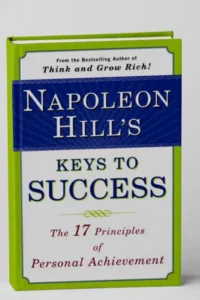Napoleon Hill summed up his philosophy of success in Think and Grow Rich!, one of the bestselling inspirational business books ever.
A recent USA Today survey of business leaders named it one of the five most influential books in its field, more than 40 years after it was first published. Now, in Napoleon Hill’s Keys to Success, Hill’s seventeen essential principles of personal achievement are expanded in detail for the first time, with concrete advice on their use and implementation.
Napoleon Hill’s Keys to Success
The title Napoleon Hill’s Keys to Success should get one’s attention—if how to be successful happens to be of interest to the reader.
The principles of success that are described in Keys to Success are not only written about, but also explained so the reader can understand and apply the principles in their lives.
Hill’s books are sold worldwide and are more popular than ever because of the principles of success and their universal appeal.
You have the same book in your hands that has been used in major universities and is still being taught today as a three-hour college course.
Napoleon Hill was born in the rugged mountains of Southwest Virginia in 1883, into what Hill described as “for three generations … his people had been born, lived, struggled ignorance, illiteracy and poverty, and died without having been outside the mountains of that section. They made their living from the soil. Whatever money they procured was from the sale of corn converted into moonshine. There were no railroads, telephones, electric lights, or passable public highways.”
Hill’s mother died when he was only nine years old, which could have added to his chances of ever being successful, but his father married a young widow who was educated. Hill described her as a blessing. His stepmother was a constant source of encouragement. She helped Napoleon obtain a typewriter, and he was writing stories by the age of fourteen.
Like millions of other Americans born into modest or impoverished means, Hill was destined to admire the likes of Thomas Edison, Andrew Carnegie, Henry Ford, and many other self-made men with passion that bordered on worship. Today, a very similar situation exists where the rich and famous are treated as gods. Like millions of other Americans, Hill would be consumed with interest about people who succeed where others fail, why, and how to structure his own life to take place among the rich and powerful. Hill would dream of meeting these giants, impressing them, and harvesting the wisdom that produced their incredible accomplishments.
But unlike most of those other millions of admirers and wonderers, Napoleon Hill was destined to fulfill his dreams. Not only did Hill meet and impress America’s greatest achievers of his day, but he would spend his entire adult-hood studying and learning their secrets to success and communicating them to the world.
Fate would have Napoleon Hill meet his mentor Andrew Carnegie, whom he set out to interview in 1908. Carnegie was seventy-four years old and resided in a sixty-four-room mansion on Fifth Avenue in New York City. Hill admired him because he knew that Carnegie, a poor immigrant boy from Scotland with very little education, had started working at the age of twelve. By the age of thirty-five, Carnegie had created America’s steel industry and had amassed a fortune. Not only did Carnegie personify the American Dream come true, but he also left such an impression on Hill that the words of wisdom from Carnegie would become the cornerstone for Hill’s philosophy of success. He would spend a lifetime developing the success principles.
As a student of Hill’s philosophy, which is as relevant today as when Hill was doing his studies, you can benefit from the experiences of others, which will save you time and help you avoid errors that others have made. You can learn the principles of success and how to apply them.
As you read, pay particular attention to the principles, starting with Definiteness of Purpose, which is the starting point of all achievement. You must define your goals, and then develop plans for reaching those goals. Napoleon Hill states that drifting through life without aim or purpose is the first cause of failure.
Once you have defined your Definiteness of Purpose, reading and studying the other sixteen principles will help you to reach goals that only a very small group of people will ever achieve. The choice is yours and the time is now.
Why have Napoleon Hill’s guides to success sold millions of copies all over the world—and today are selling better than ever?
The answer is simple. These books work. In this companion guide to the bestselling Think and Grow Rich!, Napoleon Hill shares seventeen essential principles that will spur your efforts, steel your strength, and make your dreams come true. They include: • Using the Mastermind Principle
- Focusing Your Attention
- Learning from Defeat
- Going the Extra Mile
- Improving Your Mental Attitude
For anyone seeking personal and financial stability, Napoleon Hill’s Keys to Success promises to be a valuable and important guide on the road to riches.


